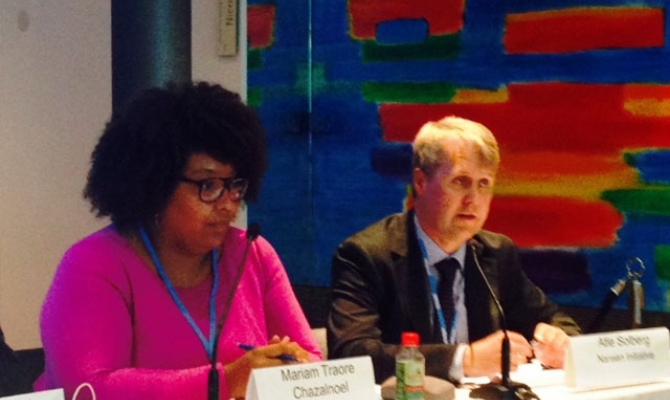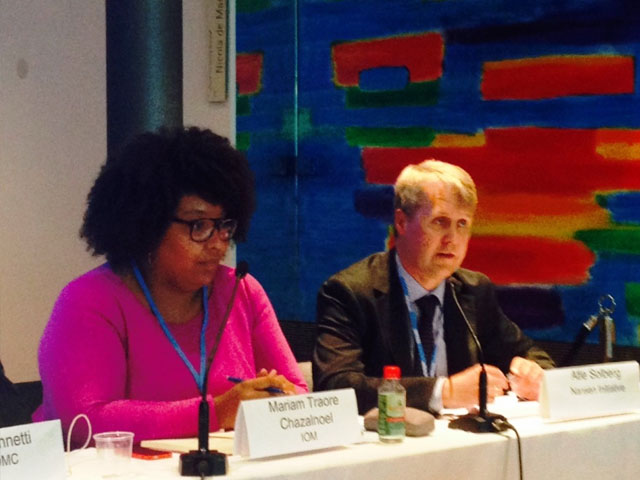
Climate Change Resilience
A panel discussion on the displacement of people from the impact and effects of climate change was held during the United Nations Framework Convention on Climate Change (UNFCCC) 42nd session of the Subsidiary Bodies and the Ad-Hoc Working Group on the Durban Platform for Enhanced Action (ADP) discussions in Bonn, Germany.
Coordinated by the Advisory Group on Climate Change and Human Mobility consisting of United Nation agencies and NGO’s, the panel consisted of experts from the Norwegian Refugee Council, International Organisation for Migration, the High Commission for Refugees, and the Nansen Initiative.

Collectively, the panel stressed the importance placed on the Paris Agreement to recognise the potential increase of people becoming displaced from the impacts and effects of climate change.
Since 2012 the Nansen Initiative has held regional consultations with governments, academia, practitioners and Civil Society in the Pacific, Americas, Africa, and Asia to discuss the issue of displacement due to the effects of climate change and disasters.
At the side event the Nansen Initiative presented the draft Protection Agenda, which consolidates and documents good practices by countries and regional organisations. The document also presents a toolbox of potential policy consideration that include the prevention of displacement, helping people move in a safe and planned environment, as well as the essential protection when displacement cannot be avoided and people are forced to move.
At the conclusion of the Nansen Initiative, Atle Solberg summarised by saying that much can be done to prevent and prepare for displacement in the future by ramping up adaptation and disaster risk reduction efforts, such as migration and planned relocation and by anchoring such measures within the Paris Climate Change Agreement.
As a follow-up to the side event, the Nansen Initiative is hosting a consultation on the draft Protection Agenda in Auckland with Pacific island countries in July.
As a final part of the Nansen Initiative process the Protection Agenda will be presented to countries in a Global meeting of the Nansen Initiative in Geneva, in October 2015.
Coordinated by the Advisory Group on Climate Change and Human Mobility consisting of United Nation agencies and NGO’s, the panel consisted of experts from the Norwegian Refugee Council, International Organisation for Migration, the High Commission for Refugees, and the Nansen Initiative.

Collectively, the panel stressed the importance placed on the Paris Agreement to recognise the potential increase of people becoming displaced from the impacts and effects of climate change.
Since 2012 the Nansen Initiative has held regional consultations with governments, academia, practitioners and Civil Society in the Pacific, Americas, Africa, and Asia to discuss the issue of displacement due to the effects of climate change and disasters.
At the side event the Nansen Initiative presented the draft Protection Agenda, which consolidates and documents good practices by countries and regional organisations. The document also presents a toolbox of potential policy consideration that include the prevention of displacement, helping people move in a safe and planned environment, as well as the essential protection when displacement cannot be avoided and people are forced to move.
At the conclusion of the Nansen Initiative, Atle Solberg summarised by saying that much can be done to prevent and prepare for displacement in the future by ramping up adaptation and disaster risk reduction efforts, such as migration and planned relocation and by anchoring such measures within the Paris Climate Change Agreement.
As a follow-up to the side event, the Nansen Initiative is hosting a consultation on the draft Protection Agenda in Auckland with Pacific island countries in July.
As a final part of the Nansen Initiative process the Protection Agenda will be presented to countries in a Global meeting of the Nansen Initiative in Geneva, in October 2015.